Anastasia Vayona writes for The Conversation about new research showing how misleading environmental labelling and claims are confusing shoppers and making recycling more confusing…
Wishcycling: how ‘eco-friendly’ labels confuse shoppers and make recycling less effective
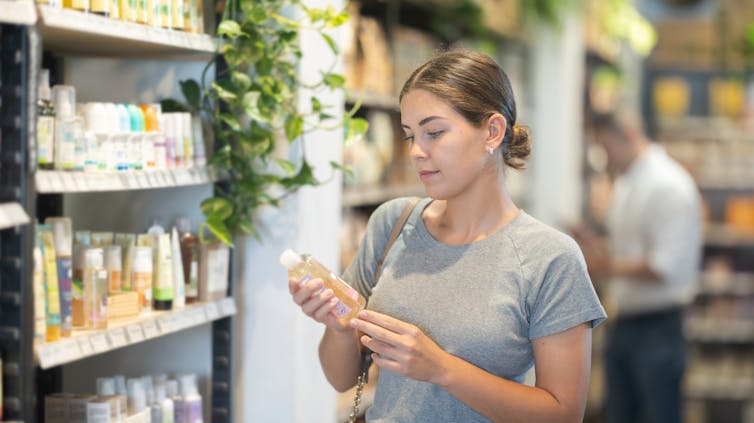
Anastasia Vayona, Bournemouth University
Have you ever thrown something in the recycling bin, hoping it’s recyclable? Maybe a toothpaste tube, bubble wrap or plastic toy labelled “eco-friendly”?
This common practice, known as “wishcycling”, might seem harmless. But my colleagues and I have published research that shows misleading environmental claims by companies are making recycling more confusing – and less effective.
This kind of marketing leads to greenwashed consumer behaviour — when people believe they are making environmentally friendly choices, but are being misled by exaggerated or false claims about how sustainable a product is.
We surveyed 537 consumers from 102 towns across the UK to explore a simple question: is there a link between greenwashed consumer behaviour and wishcycling? We wanted to find out whether they feed into each other, what drives them both, and how consumers perceive the connection.
What makes this issue particularly interesting is its psychological foundation. We argue that modern consumers have been burdened with a responsibility that may be beyond their capacity: deciding what to do with product packaging after use.
Many people are unprepared, undereducated or simply unaware of the full effect of their choices — and why should they be? This is a burden that should not rest on their shoulders. Into this gap has stepped recycling, presented as the solution. Consumers are led to believe that by recycling, they are doing their part to help the environment.
However, when products carry environmental claims or symbols — even vague ones like a green leaf, green banner or “earth-friendly” label — consumers often fall prey to what we call the “environmental halo effect”. This cognitive bias causes people to attribute positive environmental qualities to the entire product, including how it’s disposed of, even when those claims may not be accurate.
Surprisingly, our study reveals that environmentally conscious consumers can be most susceptible to this effect. Their strong environmental values may make them more inclined to trust green marketing claims, even when those claims are vague or misleading.
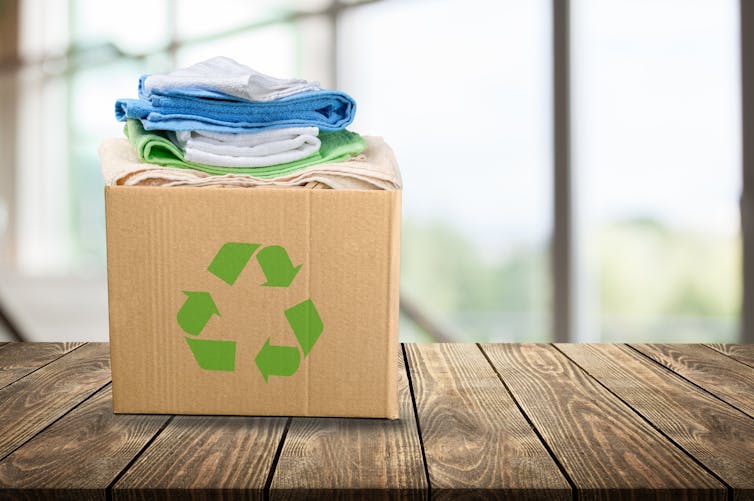
Billion Photos/Shutterstock
Driven by their desire to make sustainable choices, these consumers often accept green marketing claims at face value, assuming that environmental claims reflect genuine efforts toward sustainability.
Even more intriguingly, we found that people with higher levels of education tend to trust companies’ environmental claims more readily, especially when these companies present themselves as environmentally responsible.
This all leads to more wishcycling, not less. When companies talk about their environmental ethos and social responsibility, we’re more likely to believe their packaging is recyclable – even when it isn’t.
Our research also suggests that younger consumers, despite being generally more environmentally aware, are more likely to wishcycle. While millennials and generation Z often express strong environmental values, they’re also often more likely to contaminate recycling streams by throwing in non-recyclable items.
The future is circular
The solution is not to stop caring for the environment, but to channel that care more effectively. At the heart of this approach is the concept of a circular economy, where products and materials are reused, refurbished and recycled, rather than discarded.
The answer isn’t just better recycling – it’s better packaging design and corporate responsibility from the start. While we as consumers should continue doing our part, the primary burden should rest with manufacturers to create packaging that’s genuinely recyclable or reusable, not just marketed as “eco-friendly”.
This means implementing clear, standardised labelling that leaves no room for confusion, using packaging made from single, easily recyclable materials, and designing for reuse and refill systems.
On February 11 2025, the EU enacted a new packaging and packaging waste directive. This is designed to reduce packaging waste and support a circular economy by setting rules for how packaging should be made, used and disposed of throughout its lifecycle.
Until these systemic changes are fully implemented, we need to be both environmentally conscious and critically aware consumers. But it’s important to remember: while our daily choices and actions matter, the key to real change lies in pushing for corporate and policy-level transformation of our packaging systems.
By designing out waste, the circular economy offers a sustainable model that can guide these changes and reduce our dependence on single-use packaging. Hopefully, this can inspire us to improve current practices and keep finding better ways to do things, leading to a more sustainable and resilient future.
Don’t have time to read about climate change as much as you’d like?
Get a weekly roundup in your inbox instead. Every Wednesday, The Conversation’s environment editor writes Imagine, a short email that goes a little deeper into just one climate issue. Join the 45,000+ readers who’ve subscribed so far.![]()
Anastasia Vayona, Postdoctoral Research Fellow in Social Science and Policy, Faculty of Science and Technology, Bournemouth University
This article is republished from The Conversation under a Creative Commons license. Read the original article.
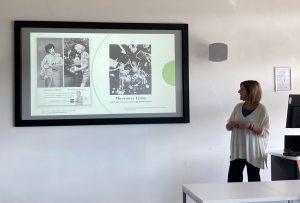
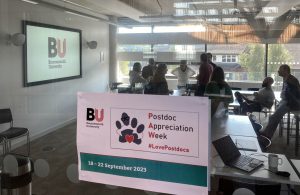
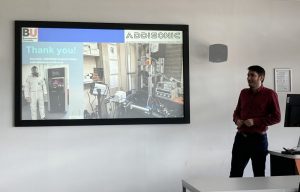











 Missing Persons Indicator Project Recruitment
Missing Persons Indicator Project Recruitment Celebrating our Research: Postgraduate Research Showcase 2026
Celebrating our Research: Postgraduate Research Showcase 2026 Nursing Research REF Impact in Nepal
Nursing Research REF Impact in Nepal Fourth INRC Symposium: From Clinical Applications to Neuro-Inspired Computation
Fourth INRC Symposium: From Clinical Applications to Neuro-Inspired Computation ESRC Festival of Social Science 2025 – Reflecting back and looking ahead to 2026
ESRC Festival of Social Science 2025 – Reflecting back and looking ahead to 2026 3C Event: Research Culture, Community & Cookies – Tuesday 13 January 10-11am
3C Event: Research Culture, Community & Cookies – Tuesday 13 January 10-11am ECR Funding Open Call: Research Culture & Community Grant – Application Deadline Friday 12 December
ECR Funding Open Call: Research Culture & Community Grant – Application Deadline Friday 12 December MSCA Postdoctoral Fellowships 2025 Call
MSCA Postdoctoral Fellowships 2025 Call ERC Advanced Grant 2025 Webinar
ERC Advanced Grant 2025 Webinar Horizon Europe Work Programme 2025 Published
Horizon Europe Work Programme 2025 Published Update on UKRO services
Update on UKRO services European research project exploring use of ‘virtual twins’ to better manage metabolic associated fatty liver disease
European research project exploring use of ‘virtual twins’ to better manage metabolic associated fatty liver disease